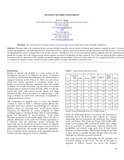| dc.description.abstract | This study looks at the relationship between insecurity challenges arising from criminal activities and private sector investment using firm level data. It assumes that insecurity influences investment decisions through its impact on market demand, costs of production,and profitability of the firm. Results show that when exposed to actual and
/or perceived insecurity, firms tend to slow their investment.Since provision of own
security services allows firms to feel safe and secure, they spend on security infrastructure,and this encourages them to increase their investment.Although firms tend to sustain their profits by pushing a proportion of the costs of providing own security services to consumers through increased prices on goods and services, possible loss
of market share with changing consumer behavior heightens uncertainty on profitability and deters investment. Even if there are prospects for future profitability,as long as the
current sales are vulnerable to insecurity,firms lower their investments as this has implications on their cash flows and ability to mobilize resources to finance investments.
Further, when there are no significant disruptions on the production process firms
invest.Thus, to secure and grow private sector investment, it is important that adequate security is provided to maintain market confidence and reduce vulnerabilities to investment returns. | en_US |

